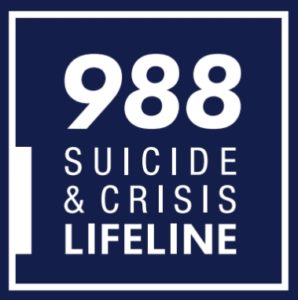There is hope. The Lifeline works and helps thousands of people overcome crisis situations every day.
On July 16, the U.S. will transition to using the 988 dialing code, and it is a once-in-a-lifetime opportunity to strengthen and expand the existing Lifeline.
The 988 dialing code is more than just an easy-to-remember number, it’s a direct connection to compassionate, accessible care and support for anyone experiencing mental health-related distress – whether that is thoughts of suicide, a mental health or substance use crisis, or any other kind of emotional distress. People can also dial 988 if they are worried about a loved one who may need crisis support.
The 988 dialing code is just a first step toward strengthening and transforming crisis care in this country. It serves as a universal entry point so that no matter where you live, you can reach a trained crisis counselor who can help.
Over time, the vision for 988 is to have additional crisis services available in communities across the nation, similar to the way emergency medical services work.
Need for 988
Too many people are experiencing a suicidal crisis or mental health-related distress without the support and care they need, and sadly, the pandemic has only made a bad situation worse when it comes to mental health and wellness in America.
There are urgent realities driving the need for crisis service transformation across our country. In 2020 alone, the U.S. had one death by suicide about every 11 minutes. And for people ages 10 to 34, suicide is a leading cause of death. Additionally, from April 2020 to 2021, more than 100,000 individuals died from drug overdoses.
There is hope. The Lifeline works and helps thousands of people overcome crisis situations every day.
About the Lifeline
The Lifeline is a national network of more than 200 local, independent crisis centers equipped to help people in mental health-related distress or experiencing a suicidal crisis via call, chat or text. It provides free and confidential support 24 hours a day, 7 days a week, across the U.S.
Numerous studies have shown that the Lifeline works. Most callers are significantly more likely to feel less depressed, less suicidal, less overwhelmed and more hopeful after speaking to a Lifeline crisis counselor.
While this is an exciting time to reimagine how we provide crisis services in the U.S., the full vision of a transformed crisis care system with 988 at its core will not be built overnight. Transformation of this scale will take time, and we must all work together to make it happen. It will require continued collaboration, commitment and support to make it effective, appropriate and sustainable, both from the public and private sectors.
If you or a loved one are experiencing a crisis, call or walk into the Polara Health Crisis Stabilization Unit located at 8655 E. Eastridge Dr., in Prescott Valley. The CSU is open 24/7. You can also call 928-445-5211 at any time. QCBN
By Deanna Eder
Deanna Eder is the director of marketing and development for Polara Health. She can be reached at d.eder@polarahealth.com







Leave a Reply